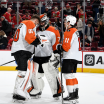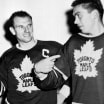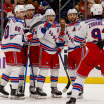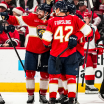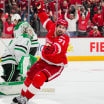NHL, NHLPA ratify CBA extension through 2025-26 season
Play resumes Aug. 1 in Toronto, Edmonton; agreement includes salary cap, Olympic participation
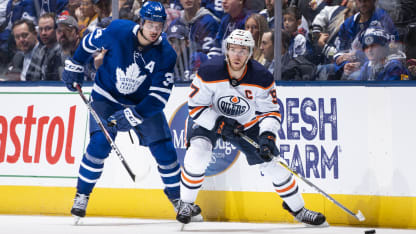
© Mark Blinch/Getty Images
The sides also ratified plans to resume play Aug. 1 at centralized hubs in Toronto and Edmonton as part of the NHL Return Play Plan.
"Today, the NHL and the NHLPA announced a significant agreement that addresses the uncertainty everyone is dealing with, the framework for the completion of the 2019-20 season, and the foundation for the continued long-term growth of our league," NHL Commissioner Gary Bettman said. "I thank NHLPA Executive Director Don Fehr and Special Assistant to the Executive Director Mathieu Schneider, the more than 700 NHL players -- particularly those who worked on our Return to Play Committee -- and the NHL's Board of Governors for coming together under extraordinary circumstances for the good of our game. While we have all worked very hard to try to address the risks of COVID-19, we know that health and safety are and will continue to be our priorities. We know that all of our fans are excited about our return to the ice next month, and that has been our goal since we paused our season on March 12.
RELATED: [Memorandum of Understanding | Stanley Cup Qualifiers schedule | CBA and Return to Play FAQ]
The NHL Board of Governors and the NHLPA membership completed their ratification votes on the extension and the protocols for Phases 3 and 4 of the Return to Play Plan on Friday.
"We're living through difficult times, uncertain times," Fehr said Saturday. "No one knows what the future would bring. And what that meant was that this wasn't and, for all practicable purposes, could not be normal collective bargaining. ... There's a lot in this agreement that I think the players can be proud of."
Training camps can open in the teams' local markets on Monday, which is the start of Phase 3. The 24 teams participating in the Return to Play Plan will travel July 26 to the two hub cities -- 12 Eastern Conference teams to Toronto and 12 Western Conference teams to Edmonton -- where they will begin play Aug. 1 with the Stanley Cup Qualifiers, which is Phase 4.
Play will resume with 16 teams paired in eight best-of-5 series and a round-robin among the top four teams in points percentage in each conference to determine seeding for the Stanley Cup Playoffs. The advancing teams will remain in Toronto and Edmonton for the first two rounds of the playoffs.
"That's good for the fans, that's good for the TV audience, that's good for the players, it's good for everybody," Carolina Hurricanes forward Justin Williams told The Associated Press. "So we're obviously excited about that. It's awesome that they were able to do this. I don't think a normal CBA negotiation goes this quickly. But both parties wanted it done and they got it done."
Edmonton will be the site of the Eastern Conference Final, Western Conference Final and Stanley Cup Final. The conference finals are tentatively set to begin Sept. 8; the Cup Final is scheduled to begin Sept. 22 and will end no later than Oct. 4.
"The Return to Play is going to be great once we get through it, once we get everybody in the bubble, and assuming everybody stays healthy," Commissioner Bettman said. "But this was much more than the Return to Play. It was about maintaining, stabilizing during this time and focusing on future of the game."
Each of the eight teams eliminated from the qualifiers will have an equal chance (12.5 percent) at the No. 1 pick in the 2020 NHL Draft in the Second Phase of the NHL Draft Lottery. That drawing will be held Aug. 10. The 2020 NHL Draft is scheduled for Oct. 9 and 10.
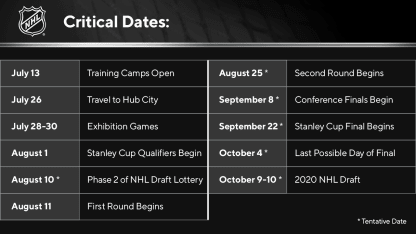
The free agency period this offseason will begin after the NHL Draft and Stanley Cup Final are completed.
"It's a great day that everything has been finalized," Calgary Flames general manager Brad Treliving told Sportsnet. "To me, the League and the Players' Association deserve a tremendous amount of credit.
"We're all living in this environment, and know how difficult it is, and to get a Return to Play Plan and to get a CBA done during a pandemic, it's unbelievable. The ability to find common ground ... I just think Gary and [Deputy Commissioner Bill Daly] and League leadership and the [NHLPA] deserve so much credit. You're talking about two monumental tasks, and they did it at a time when things change from Monday to Tuesday. It's a Herculean effort."
The CBA extension ensures labor peace for the NHL teams and players for six seasons following this one. That will enable the League and union to chart long-term plans for an international calendar and events including the Winter Olympics, NHL All-Star Game, NHL Winter Classic and NHL Stadium Series.
"It was a recognition by both sides that we would be confronted with an incredibly difficult and novel, unprecedented situation and then to get through it for the good of our constituents and good of the game and for the good of our fans, we needed to work together to solve the myriad of problems that would be in front of us," Commissioner Bettman said. "... so that we could get through his period with our franchises strong and intact, our game as strong as it can be, being appropriate and fair and protective of all the players because health and safety in everything we discussed was paramount."
The existing CBA, ratified in January 2013, was scheduled to expire Sept. 15, 2022. With this extension, it will expire Sept. 15, 2026.
Highlights of the agreement include:
-- The NHL salary cap will remain at $81.5 million for the 2020-21 season with provisions for it to increase incrementally in the following seasons if hockey-related revenue reaches certain thresholds.
-- Escrow (the percentage withheld from player salaries and placed in an account used to calculate a 50-50 split of hockey-related revenue) will be capped at 20 percent for the 2020-21 season, 14-18 percent in 2021-22, 10 percent in 2022-23, and 6 percent in 2023-24, 2024-25 and 2025-26.
-- A year will automatically be added to the CBA, through the 2026-27 season and expiring Sept. 16, 2027, if after the 2024-25 season the players' escrow debt exceeds $125 million but is less than $250 million.
-- NHL players will return to Olympic competition at the 2022 Beijing Games and the 2026 Milano Cortina Games, pending agreements being reached with the International Ice Hockey Federation and International Olympic Committee. NHL players did not participate in the 2018 PyeongChang Olympics after competing in the Winter Games in 1998, 2002, 2006, 2010 and 2014.
-- Players will defer 10 percent of their salaries for the 2020-21 season that will be paid out in equal installments over three seasons beginning in 2022-23.
-- The playoff bonus pool will double this season from $16 million to $32 million. The compensation to each player will increase each round.
-- The NHL minimum salary will increase from $700,000 to $750,000 in 2021-22 and 2022-23, and $775,000 in 2023-24, 2024-25 and 2025-26.
-- The maximum entry-level salary will increase from $925,000 for 2019, 2020 and 2021 NHL Draft picks to $950,000 for 2022 and 2023 NHL Draft picks, $975,000 for 2024 and 2025 NHL Draft picks, and $1 million for 2026 NHL Draft picks.
The NHL lost games prior to ratifying the past three collective bargaining agreements, including the entire 2004-05 season, and the first three months of 2012-13 and 1994-95 (34 games per team).
The NHL and the NHLPA each declined its option to reopen the existing agreement in September 2019, which would have triggered its expiration on Sept. 15, 2020. The sides instead decided to continue discussions about an extension that began during the 2019 offseason.
Negotiations continued after the NHL paused this season March 12 due to concerns surrounding the coronavirus and have been a part of the process of determining the Return to Play Plan. Those talks culminated Monday with an announcement of an agreement in principle on a memorandum of understanding.
Ottawa Senators defenseman Ron Hainsey, Edmonton Oilers center Connor McDavid, Winnipeg Jets center Mark Scheifele, Toronto Maple Leafs center John Tavares, and Philadelphia Flyers right wing James van Riemsdyk were the players on the Return to Play Committee.









